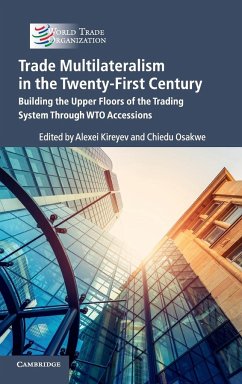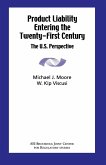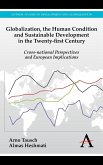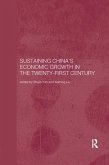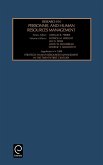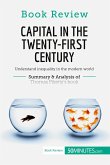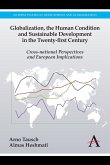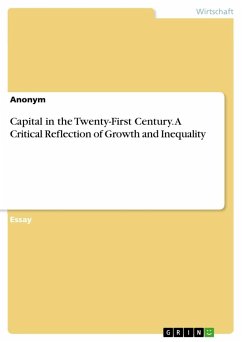Trade Multilateralism in the Twenty-First Century
Herausgeber: Kireyev, Alexei; Osakwe, Chiedu
Trade Multilateralism in the Twenty-First Century
Herausgeber: Kireyev, Alexei; Osakwe, Chiedu
- Gebundenes Buch
- Merkliste
- Auf die Merkliste
- Bewerten Bewerten
- Teilen
- Produkt teilen
- Produkterinnerung
- Produkterinnerung
Trade multilateralism in the twenty-first-century century faces a serious test as weakness in the global economy and fast-paced technological changes create a challenging environment for world trade.
Andere Kunden interessierten sich auch für
![Product Liability Entering the Twenty-First Century Product Liability Entering the Twenty-First Century]() Michael J. MooreProduct Liability Entering the Twenty-First Century17,99 €
Michael J. MooreProduct Liability Entering the Twenty-First Century17,99 €![Globalization, the Human Condition and Sustainable Development in the Twenty-first Century Globalization, the Human Condition and Sustainable Development in the Twenty-first Century]() Arno TauschGlobalization, the Human Condition and Sustainable Development in the Twenty-first Century118,99 €
Arno TauschGlobalization, the Human Condition and Sustainable Development in the Twenty-first Century118,99 €![Sustaining China's Economic Growth in the Twenty-first Century Sustaining China's Economic Growth in the Twenty-first Century]() Sustaining China's Economic Growth in the Twenty-first Century68,99 €
Sustaining China's Economic Growth in the Twenty-first Century68,99 €![Strategic Human Resources Management in the Twenty-First Century Strategic Human Resources Management in the Twenty-First Century]() P.M. Wright / L.D. Dyer / J.W. Boudreau (eds.)Strategic Human Resources Management in the Twenty-First Century192,99 €
P.M. Wright / L.D. Dyer / J.W. Boudreau (eds.)Strategic Human Resources Management in the Twenty-First Century192,99 €![Book Review: Capital in the Twenty-First Century by Thomas Piketty Book Review: Capital in the Twenty-First Century by Thomas Piketty]() 50minutesBook Review: Capital in the Twenty-First Century by Thomas Piketty9,99 €
50minutesBook Review: Capital in the Twenty-First Century by Thomas Piketty9,99 €![Globalization, the Human Condition and Sustainable Development in the Twenty-first Century Globalization, the Human Condition and Sustainable Development in the Twenty-first Century]() Arno TauschGlobalization, the Human Condition and Sustainable Development in the Twenty-first Century51,99 €
Arno TauschGlobalization, the Human Condition and Sustainable Development in the Twenty-first Century51,99 €![Capital in the Twenty-First Century. A Critical Reflection of Growth and Inequality Capital in the Twenty-First Century. A Critical Reflection of Growth and Inequality]() AnonymCapital in the Twenty-First Century. A Critical Reflection of Growth and Inequality18,95 €
AnonymCapital in the Twenty-First Century. A Critical Reflection of Growth and Inequality18,95 €-
-
-
Trade multilateralism in the twenty-first-century century faces a serious test as weakness in the global economy and fast-paced technological changes create a challenging environment for world trade.
Hinweis: Dieser Artikel kann nur an eine deutsche Lieferadresse ausgeliefert werden.
Hinweis: Dieser Artikel kann nur an eine deutsche Lieferadresse ausgeliefert werden.
Produktdetails
- Produktdetails
- Verlag: Cambridge University Press
- Seitenzahl: 458
- Erscheinungstermin: 25. Januar 2018
- Englisch
- Abmessung: 235mm x 157mm x 29mm
- Gewicht: 811g
- ISBN-13: 9781108421287
- ISBN-10: 1108421288
- Artikelnr.: 48687060
- Herstellerkennzeichnung
- Libri GmbH
- Europaallee 1
- 36244 Bad Hersfeld
- gpsr@libri.de
- Verlag: Cambridge University Press
- Seitenzahl: 458
- Erscheinungstermin: 25. Januar 2018
- Englisch
- Abmessung: 235mm x 157mm x 29mm
- Gewicht: 811g
- ISBN-13: 9781108421287
- ISBN-10: 1108421288
- Artikelnr.: 48687060
- Herstellerkennzeichnung
- Libri GmbH
- Europaallee 1
- 36244 Bad Hersfeld
- gpsr@libri.de
The General Agreement on Tariffs and Trade (GATT) was created in 1947 and operated almost five decades on a provisional basis until 1995 when the WTO was established. Its goal is to improve the welfare of peoples of its member countries, specifically by lowering trade barriers and providing a platform for the negotiation of trade. The organization deals with the rules of trade between nations at a global or near global level; it is responsible for negotiating and implementing new trade agreements and charged with policing Member Countries' adherence to all WTO agreements. In 2007 there were 150 Member States.
1. Making trade multilateralism work for all: the role of WTO accessions
Alexei Kireyev and Chiedu Osakwe; Part I. WTO Accessions And The New Trade
Multilateralism: 2. The WTO and the changing state of the global economy
Alexei Kireyev; 3. The art and science of negotiation: de-politicizing and
technicizing negotiations Micheline Calmy-Rey and Svenja Rauch; 4. The
accession of Kazakhstan: dealing with complexity Alexei Kireyev, Chiedu
Osakwe and Anna Varyanik; 5. Helping businesses navigate WTO accession
Arancha González; 6. WTO rules, accession protocols and mega-regionals -
complementarity and governance in the rules-based global economy Maa Leki¿
and Chiedu Osakwe; 7. Promoting good governance: from encouraging a
principle to taking concrete action - examples from WTO accession protocols
and the WTO Trade Facilitation Agreement Juneyoung Lee, Nora Neufeld and
Anna Varyanik; 8. Transforming accessions data into knowledge Hubert
Escaith, Chiedu Osakwe, Vicky Chemutai and Ying Yan; Part II. Negotiators'
Perspectives On The WTO Accession Process: 9. Accession of Liberia: an
agenda for transformation Ellen Johnson Sirleaf and Axel Addy; 10.
Afghanistan's accession: challenged by conflict Humayoon Rasaw; 11. The WTO
accession of Seychelles: lessons from a small island economy Pierre
Laporte, Charles Morin and Cillia Mangroo; 12. WTO accession negotiations
from a negotiator's perspective Atsuyuki Oike; Part III. Accessions Acquis:
Thematic Perspectives and Implementation Challenges: 13. How post-TRIPS
negotiations reframe the 'trade-related aspects' of intellectual property
after TRIPS: the lessons of WTO accessions Antony Taubman; 14. Competition
policy in WTO accessions: filling in the blanks in the international
trading system Robert D. Anderson, Anna Caroline Müller and Nivedita Sen;
15. Geographical indications in the accessions landscape Tatiana Yanguas
Acosta; 16. WTO accession commitments on agriculture: lessons for WTO
rule-making Diwakar Dixit; 17. The WTO-plus obligations: dual class or a
strengthened system? Nannan Gao and Fangying Zheng; 18. Accession protocols
and the private sector Josefita Pardo de León and Mariam Soumaré; 19.
Post-accession support platform Maika Oshikawa; 20. Conclusion - trade
multilateralism: enhancing flexibility, preserving the momentum Alexei
Kireyev and Chiedu Osakwe.
Alexei Kireyev and Chiedu Osakwe; Part I. WTO Accessions And The New Trade
Multilateralism: 2. The WTO and the changing state of the global economy
Alexei Kireyev; 3. The art and science of negotiation: de-politicizing and
technicizing negotiations Micheline Calmy-Rey and Svenja Rauch; 4. The
accession of Kazakhstan: dealing with complexity Alexei Kireyev, Chiedu
Osakwe and Anna Varyanik; 5. Helping businesses navigate WTO accession
Arancha González; 6. WTO rules, accession protocols and mega-regionals -
complementarity and governance in the rules-based global economy Maa Leki¿
and Chiedu Osakwe; 7. Promoting good governance: from encouraging a
principle to taking concrete action - examples from WTO accession protocols
and the WTO Trade Facilitation Agreement Juneyoung Lee, Nora Neufeld and
Anna Varyanik; 8. Transforming accessions data into knowledge Hubert
Escaith, Chiedu Osakwe, Vicky Chemutai and Ying Yan; Part II. Negotiators'
Perspectives On The WTO Accession Process: 9. Accession of Liberia: an
agenda for transformation Ellen Johnson Sirleaf and Axel Addy; 10.
Afghanistan's accession: challenged by conflict Humayoon Rasaw; 11. The WTO
accession of Seychelles: lessons from a small island economy Pierre
Laporte, Charles Morin and Cillia Mangroo; 12. WTO accession negotiations
from a negotiator's perspective Atsuyuki Oike; Part III. Accessions Acquis:
Thematic Perspectives and Implementation Challenges: 13. How post-TRIPS
negotiations reframe the 'trade-related aspects' of intellectual property
after TRIPS: the lessons of WTO accessions Antony Taubman; 14. Competition
policy in WTO accessions: filling in the blanks in the international
trading system Robert D. Anderson, Anna Caroline Müller and Nivedita Sen;
15. Geographical indications in the accessions landscape Tatiana Yanguas
Acosta; 16. WTO accession commitments on agriculture: lessons for WTO
rule-making Diwakar Dixit; 17. The WTO-plus obligations: dual class or a
strengthened system? Nannan Gao and Fangying Zheng; 18. Accession protocols
and the private sector Josefita Pardo de León and Mariam Soumaré; 19.
Post-accession support platform Maika Oshikawa; 20. Conclusion - trade
multilateralism: enhancing flexibility, preserving the momentum Alexei
Kireyev and Chiedu Osakwe.
1. Making trade multilateralism work for all: the role of WTO accessions
Alexei Kireyev and Chiedu Osakwe; Part I. WTO Accessions And The New Trade
Multilateralism: 2. The WTO and the changing state of the global economy
Alexei Kireyev; 3. The art and science of negotiation: de-politicizing and
technicizing negotiations Micheline Calmy-Rey and Svenja Rauch; 4. The
accession of Kazakhstan: dealing with complexity Alexei Kireyev, Chiedu
Osakwe and Anna Varyanik; 5. Helping businesses navigate WTO accession
Arancha González; 6. WTO rules, accession protocols and mega-regionals -
complementarity and governance in the rules-based global economy Maa Leki¿
and Chiedu Osakwe; 7. Promoting good governance: from encouraging a
principle to taking concrete action - examples from WTO accession protocols
and the WTO Trade Facilitation Agreement Juneyoung Lee, Nora Neufeld and
Anna Varyanik; 8. Transforming accessions data into knowledge Hubert
Escaith, Chiedu Osakwe, Vicky Chemutai and Ying Yan; Part II. Negotiators'
Perspectives On The WTO Accession Process: 9. Accession of Liberia: an
agenda for transformation Ellen Johnson Sirleaf and Axel Addy; 10.
Afghanistan's accession: challenged by conflict Humayoon Rasaw; 11. The WTO
accession of Seychelles: lessons from a small island economy Pierre
Laporte, Charles Morin and Cillia Mangroo; 12. WTO accession negotiations
from a negotiator's perspective Atsuyuki Oike; Part III. Accessions Acquis:
Thematic Perspectives and Implementation Challenges: 13. How post-TRIPS
negotiations reframe the 'trade-related aspects' of intellectual property
after TRIPS: the lessons of WTO accessions Antony Taubman; 14. Competition
policy in WTO accessions: filling in the blanks in the international
trading system Robert D. Anderson, Anna Caroline Müller and Nivedita Sen;
15. Geographical indications in the accessions landscape Tatiana Yanguas
Acosta; 16. WTO accession commitments on agriculture: lessons for WTO
rule-making Diwakar Dixit; 17. The WTO-plus obligations: dual class or a
strengthened system? Nannan Gao and Fangying Zheng; 18. Accession protocols
and the private sector Josefita Pardo de León and Mariam Soumaré; 19.
Post-accession support platform Maika Oshikawa; 20. Conclusion - trade
multilateralism: enhancing flexibility, preserving the momentum Alexei
Kireyev and Chiedu Osakwe.
Alexei Kireyev and Chiedu Osakwe; Part I. WTO Accessions And The New Trade
Multilateralism: 2. The WTO and the changing state of the global economy
Alexei Kireyev; 3. The art and science of negotiation: de-politicizing and
technicizing negotiations Micheline Calmy-Rey and Svenja Rauch; 4. The
accession of Kazakhstan: dealing with complexity Alexei Kireyev, Chiedu
Osakwe and Anna Varyanik; 5. Helping businesses navigate WTO accession
Arancha González; 6. WTO rules, accession protocols and mega-regionals -
complementarity and governance in the rules-based global economy Maa Leki¿
and Chiedu Osakwe; 7. Promoting good governance: from encouraging a
principle to taking concrete action - examples from WTO accession protocols
and the WTO Trade Facilitation Agreement Juneyoung Lee, Nora Neufeld and
Anna Varyanik; 8. Transforming accessions data into knowledge Hubert
Escaith, Chiedu Osakwe, Vicky Chemutai and Ying Yan; Part II. Negotiators'
Perspectives On The WTO Accession Process: 9. Accession of Liberia: an
agenda for transformation Ellen Johnson Sirleaf and Axel Addy; 10.
Afghanistan's accession: challenged by conflict Humayoon Rasaw; 11. The WTO
accession of Seychelles: lessons from a small island economy Pierre
Laporte, Charles Morin and Cillia Mangroo; 12. WTO accession negotiations
from a negotiator's perspective Atsuyuki Oike; Part III. Accessions Acquis:
Thematic Perspectives and Implementation Challenges: 13. How post-TRIPS
negotiations reframe the 'trade-related aspects' of intellectual property
after TRIPS: the lessons of WTO accessions Antony Taubman; 14. Competition
policy in WTO accessions: filling in the blanks in the international
trading system Robert D. Anderson, Anna Caroline Müller and Nivedita Sen;
15. Geographical indications in the accessions landscape Tatiana Yanguas
Acosta; 16. WTO accession commitments on agriculture: lessons for WTO
rule-making Diwakar Dixit; 17. The WTO-plus obligations: dual class or a
strengthened system? Nannan Gao and Fangying Zheng; 18. Accession protocols
and the private sector Josefita Pardo de León and Mariam Soumaré; 19.
Post-accession support platform Maika Oshikawa; 20. Conclusion - trade
multilateralism: enhancing flexibility, preserving the momentum Alexei
Kireyev and Chiedu Osakwe.

